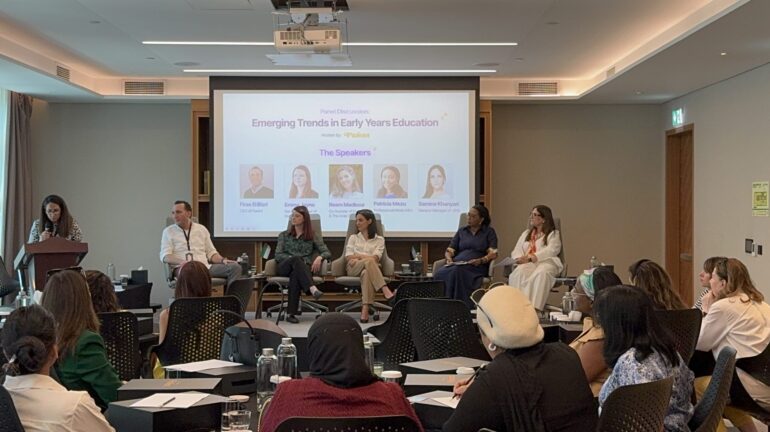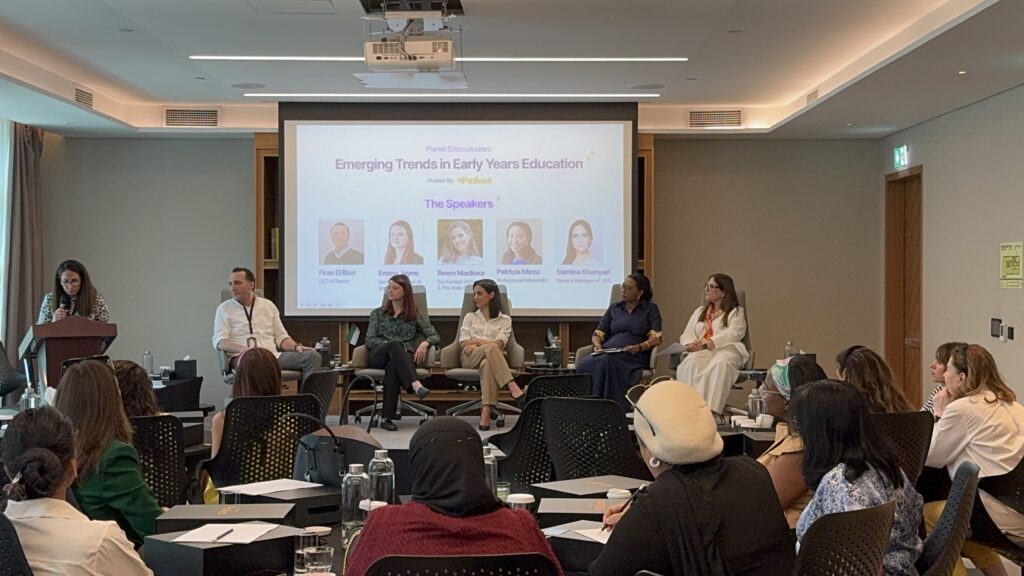
Parent App, a leading platform transforming communication and management in early childhood centers, recently hosted an insightful panel discussion at the Hilton DoubleTree Hotel in Business Bay – Dubai, to provide a well needed platform for engaging conversations and sharing best practices.The event brought together nursery owners, center leaders, early years practitioners, pediatric healthcare professionals, parenting experts, media personalities, and policymakers, including government representatives to explore the integration of artificial intelligence (AI) in early childhood education and the UAE’s new national AI curriculum initiative. Strategically moderated by Dana Alqinneh – Head of Pedagogy at Parent, early childhood educator and curriculum consultant, panelists explored both the pros and cons of using AI in early childhood education.
ECEs and nurseries have become the “village” that is essential for the development of young children, as introduced by Nadine Moussallem, Chief Marketing Officer at Parent currently driving growth in the childcare technology sector. “As AI becomes part of early learning environments, educators face the important task of introducing children not just to technology, she stated, but to the ethical understanding of how it interacts with the world around them, planting the seeds for digital citizenship and responsible tech use.” Panelists emphasized that for AI integration to be meaningful and developmentally appropriate, key hurdles must be addressed—including shifting mindsets, updating classroom practices, and developing supportive policies.
Exploring the UAE Government’s New Initiative on a National AI Curriculum:
The UAE government recently unveiled its new progressive initiative focused on integrating AI into national curricula, as early as kindergarten. On the positive side, AI was highlighted for its potential to enhance teaching and learning through data-driven insights, helping identify early signs of developmental challenges and supporting personalized learning approaches. It also has the potential to streamline administrative tasks, allowing practitioners more time to focus on nurturing children, as stated by panelist Samina Khanyari, General Manager of Jumeirah International Nurseries who is focused on implementing innovative educational practices and fostering strong parent-centre partnerships across multiple sites.
According to the App, AI can also play a key role in early intervention. “Artificial intelligence in early childhood education can support early intervention by detecting behavioral changes—such as reduced eye contact—through image analysis, enhancing developmental monitoring.” revealed Firas El Bizri, CEO of Parent App. “While AI can help identify patterns or early warning signs, it is essential that it doesn’t undermine the expertise and instinct of educators who are trained to make decisions based on body language, cues, and connection with the children,” stressed a pediatric healthcare professional from the audience. Panelist Patricia Mezu, founder and director of Professional Minds MEA, also mentioned “bias” when it
comes to AI analyzing such data, and whether or not we could be exposing children to biased pathways of intervention.
Samina Khanyari highlighted AI’s potential to assist educators with administrative tasks like tagging children in photos or refining parent-teacher communication, allowing more time to focus on nurturing children. AI insights are now helping nurseries streamline workloads, improving mental health in an industry with high liability in hopes to reduce the staff
turnovers, a key issue highlighted by Parent App’s data analysis.
She also discussed the importance of aligning AI tools with developmental goals: “AI-powered tools in nurseries can assist with routine management, from tracking naptimes to predicting tantrums, improving classroom dynamics and educator response.” From an educational leadership perspective, “it extends beyond just the implementation of AI technologies; it involves recruitment of the right professionals and ensuring these educators receive comprehensive training in how to use these tools effectively,” noted Emma Jayne Morgan, general manager of Quest/EYES who supports early years teams in delivering excellence in learning environments and child-centered care. She stressed the importance of dedicating budgets on educator training which is as important as necessities like rent, water and electricity.
Ethical considerations, data privacy, and the fear of AI being used to analyze children without human oversight were also discussed with Firas, highlighting the risks posed by using cheap or free AI tools that may have lower security. Patricia Mezu, who is a leadership specialist and advises early childhood leaders on regulatory compliance and safe learning frameworks, stressed the importance of incorporating safeguarding and leadership mindsets into inspection standards within early childhood education.
Arabic Language Mandate: Preserving Cultural Identity
The panel also explored a new mandate by the UAE government requiring that 33% of weekly instruction in early childhood settings be delivered in Arabic. To implement this, nurseries will adopt the “one teacher, one language” model—mirroring the “one parent, one language” concept—where each educator speaks exclusively in one language, such as Arabic or English, without switching between the two in the same classroom. Research shows that a child needs to hear a word 65 to 85 times for it to become embedded in their vocabulary, making language consistency crucial. Panelist Reem Madkour, Author, and Co-founder of Dardasha and The Arab Child Summit, advocates for children’s rights and empowers Arab communities
and parents to take back their identity, through her narratives, innovative resources, and initiatives around the U.A.E. She emphasized the importance of connecting with the Arabic language through everyday activities like cooking, music, play, and family traditions rather than sticking to formal learning. “We need to teach life in Arabic, not just Arabic as a language,” she
added.
As the discussion concluded, one message stood out clearly: AI is not a creator—it gathers and processes information from external sources but does not generate original thought or replace human insight. To ensure responsible integration, AI should be viewed as a tool—an assistant and facilitator, not a decision-maker. As the education sector continues to embrace innovation, Parent encourages continued discussion, research, and partnership to ensure that technology enhances—rather than replaces—the human connections at the heart of early learning.
